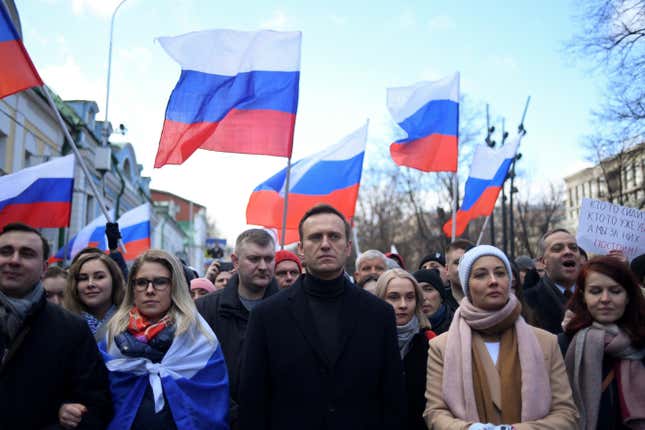
One week after the reported death of jailed Russian opposition leader Alexei Navalny, the U.S. White House has imposed more than 500 new sanctions against Russian individuals and entities. The announcement heightens existing sanctions on Russia tied to the nation’s ongoing invasion of Ukraine, which reaches its two-year anniversary on Saturday (Feb. 24).
U.S. President Joe Biden said the sanctions target individuals involved with the opposition leader’s imprisonment, Russia’s finance industry, its defense industry, procurement networks, and Russian sanctions evaders around the world. “They will ensure Putin pays an even steeper price for his aggression abroad and repression at home,” Biden said. Additionally, the US is imposing new export restrictions on around 100 entities the White House says have provided “backdoor support for Russia’s war machine,” and is targeting Russia’s energy revenues.
Biden also called on the House of Representatives to pass its bipartisan national security supplemental bill, which would provide funding for Ukraine and other allies.
But will new sanctions impact Russia’s economy?
According to the latest world economic outlook from the International Monetary Fund (IMF), Russia’s GDP is expected to grow 2.6% in 2024, up from 1.1% predicted in October, driven by all the money Russia is spending on its invasion.
The IMF said its forecast shows “carryover from stronger-than-expected growth in 2023 on account of high military spending and private consumption, supported by wage growth in a tight labor market.”
Indeed, Russia’s GDP has been defying Western sanctions from the U.S. and Europe. In 2022, the Russian economy shrank just 2.1% — far below the 10% to 15% predicted after sanctions hit the country in March of that year. And despite more sanctions hitting since then, Russia’s economy actually expanded 3.6% in 2023 — outpacing growth in both the U.S. and Europe.
But despite the country’s spending on its invasion likely making up for any setbacks from international sanctions, IMF managing director Kristalina Georgieva told CNBC Russia’s future looks worrying.
“What it tells us is that this is a war economy in which the state — which, let’s remember, had a very sizable buffer, built over many years of fiscal discipline — is investing in this war economy,” she said. “If you look at Russia, today, production goes up [for the] military, [and] consumption goes down. And that is pretty much what the Soviet Union used to look like. High level of production, low level of consumption.”
The European Union also agreed on a sanctions package against Russia on Wednesday (Feb. 21), targeting individuals and companies, including those in China, suspected of aiding Russia in its invasion.